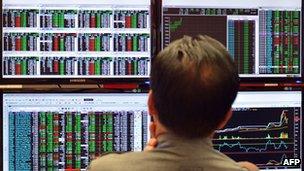Indonesia stocks enter bear market amid slowdown fears
- Published

Investor confidence has been hurt by slowing economic growth in Indonesia
Indonesia stocks have continued to drop on concerns of slowing economic growth and a widening current account deficit.
The Jakarta Composite Index fell 4.9% on Tuesday, putting it in "bear market" territory - typically defined as a 20% fall from a stock index's recent peak.
The index has now fallen 21% from its high in May.
The concerns about Indonesia's economy have also weighed on its currency, the rupiah, which has fallen to a four-year low against the US dollar.
The rupiah traded at about 10,694 to the dollar on Tuesday, down nearly 11% since the start of this year.
Other stock indexes in Asia also fell, as concerns continued to rise that the US central bank will start to taper off its key stimulus programme and start raising interest rates sooner than previously thought.
The US Federal Reserve has used the programme, known as quantitative easing, to increase the money supply and improve liquidity in the financial system.
A part of that increased liquidity flowed to emerging economies, especially in Asia, triggering a surge in stock and asset prices over the past few years.
However, Asian markets have become much more volatile in recent weeks amid fears that the Fed's stimulus policies are coming to an end.
On Tuesday, Japan's Nikkei 225 index dipped 2.6%, Hong Kong's Hang Seng was down 1.9% and South Korea's Kospi declined 1.6%.
The Indian rupee also fell sharply for a second successive day, reaching a new low of 64 rupee to the US dollar, before bouncing back, with the country's central bank rumoured to have intervened in the market.
Crisis fears
Last week, Indonesia's central bank said that its current account deficit widened to $9.8bn (£6.3bn) during the second quarter of the year, from $5.8bn in the previous three months.
The central bank also said that the foreign currency reserves it holds fell to $92.67bn in July, from $98.09bn a month earlier.
A current account deficit - which is a broader measure than the trade deficit, and includes cross-border investment income flows - affects a country's foreign currency reserves as well as the value of its currency.
Analysts said that the rising deficit had hurt investor morale.
"Although the current level of reserves is still equivalent to a reasonably healthy 5.5 months of imports, the [central] bank can't continue to burn reserves at the current rate without the market worrying about a 'crisis' scenario unfolding," economists at Credit Suisse said in a note to clients on Monday.
Slowing growth
The decline in stocks and the currency comes at a time when Indonesia's economic growth has been slowing.
The South East Asian economy grew at an annual rate of 5.81% in the April-to-June quarter, the first time since 2010 that the growth rate has fallen below 6%.
At the same time, the inflation rate in the country has been rising. Consumer prices rose 8.61% in July from a year earlier, up from a 5.9% rate in June,
That has triggered concerns that the central bank may tighten monetary policy.
The bank has already raised its benchmark interest rate by three-quarters of a percentage point in recent months, in an attempt to contain consumer price rises.
The fear is that any further tightening may dampen domestic demand and hurt the country's economic growth.
"If the currency continues to devalue and the cost of borrowing goes up, consumers are likely to be squeezed by both the factors and as a result consumption will be hurt," said Tony Nash Managing director of IHS Global Insight.
- Published19 July 2013
- Published11 July 2013
- Published6 May 2013